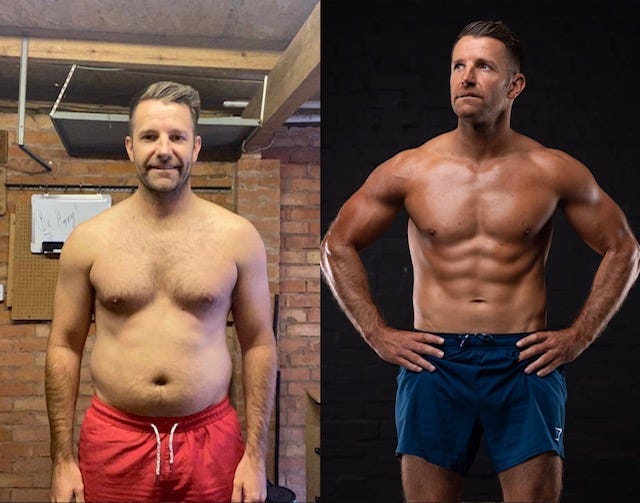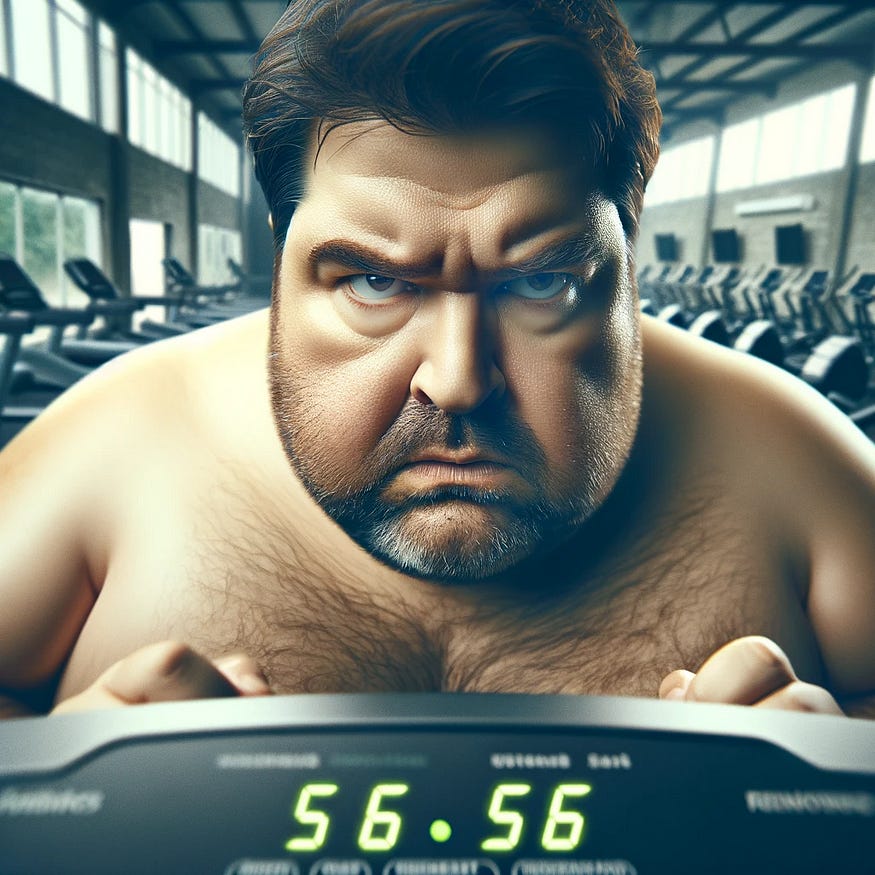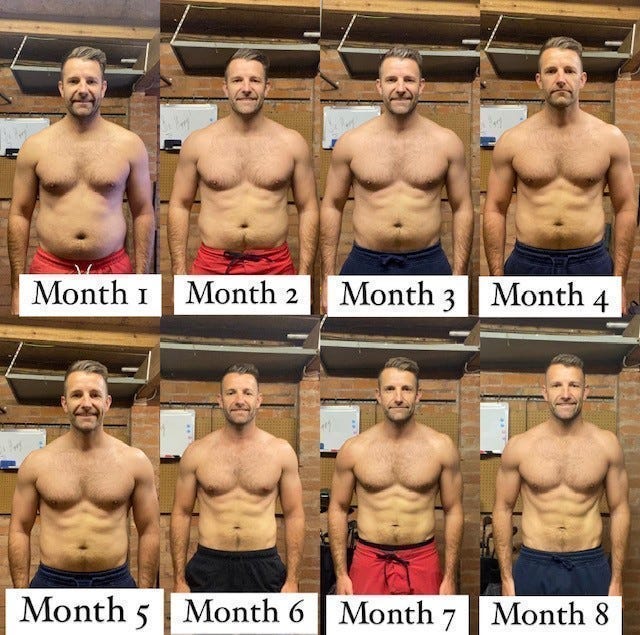To Quickly Lose 56+ Pounds, Remove These Crippling Roadblocks for Relentless Progress.
You’re not everything you could be, and you know it.
Between writing about modern finance, I also share my fitness journey. The part I love most, as a result of the countless kind messages from people, is the accountability it gives me to stay fit. It’s a responsibility I don’t take for granted. I hope you enjoy.
An old buddy once told me, “Jay, in business, momentum is everything.”
I’ve learned that it’s also a metaphor for health and wellness.
I lost 56 pounds of fat in under 12 months, so I know a thing or two about losing weight.
My journey, at times, was soul-crushing — I’d have constant doubts about whether I could lose weight, and it hinged on me not trusting the process.
Whenever I tried hitting the gym regularly and eating better, my shaky willpower would disintegrate momentum.
I’d mentally debate skipping workouts to meet my buddies at the bar. Then, when I sipped that beer, zoned out, irritable at the people around me, I’d think quietly — “Looks like I’m back on the same old path”.
As Jordan Peterson puts it:
“If you aren’t moving forward in your life, there is some idea, mode of action, or habit you’re so in love with you won’t let go of it.”
For me, it was the rush of dopamine from binge drinking, indulging in sugar-packed sweets, and making plans for future actions that never materialised.
Here’s how I fixed that and how you can, too.

Every action you take is a vote for the person you wish to become.
These ideas rewired my brain.
In his best-selling book Atomic Habits, James Clear says there is no single event that will transform your identity.
It’s why meaningful change doesn’t require anything radical, but as the small votes for yourself build up, so does the evidence of your new identity.
James Clear — Atomic Habits
“Small habits can make a meaningful difference by providing evidence of a new identity. And if a change is meaningful, it is actually big. That’s the paradox of making small improvements.”
My ultimate low was when my weight hit 223 pounds, and I was considered clinically obese, with a BMI of 34.1.
The pandemic and my former wage slave job induced anxiety — which got me out of the office and walking more because it gave me immediate relief from that heavy feeling pressing on my chest.
Every walk I took was a step towards the person I aspired to be, and with each day I finished this straightforward yet impactful routine, I noticed a gradual shift in my identity.
Walking turned into long hikes at the weekend.
Then I attempted a run — which miss-fired like a beat-up Honda. I’d stop at the end of my road, barely getting to 100 metres. But I kept on trying and eventually did a 5km.
Those runs turned into 3 — 5km per week and a gym membership, which became a weight training routine.
Something small, like a walk, began making a meaningful difference.
I had no idea it would lead me to a path of being at 12% body fat with abs at 37 and in the best shape of my life.
But it did.
If you aim at nothing, you’ll hit every time.
Having a compass does more than keep you on course.
As one of my favourite authors, Darren Hardy says in The Compound Effect — “Track every action that relates to the area of your life you want to improve. All winners are trackers.”
Before discovering this fundamental yet crucial fitness metric, I was like a disoriented hiker on my fitness journey, navigating without a GPS.
10,000 steps is significant for a few reasons.
If you can walk this amount daily, it’s like pulling an acorn out of the river wall, setting off an avalanche of momentum for other activities.
You burn around 300 calories, about 30 pounds of weight lost a year, but the tracking becomes an obsessive motivating habit with an overflow effect.
Like how my walking evolved into running, the tracking had the same impact in other areas of my life, like monitoring my food and my gym routine.
It’s become the launch pad for my success because these habits have become things I always do.
I never miss a walk ever. Even if I’m on holiday.
Neuroscientist Andrew Huberman says, “The more activities you can do that aren’t context-dependent” i.e., you can do them anywhere, even away from home — “The more chance you have of sticking to them”.
Start tracking something small, and you’ll start seeing yourself differently.
Discover how you unlock unwavering progress.
It starts with the first domino.
Once I gathered momentum along my journey of losing 56 pounds, self-doubt started to creep in.
It’s like getting halfway up a ladder and looking at the ground. You then have this pebble in your shoe for the rest of the journey — reminding you that any wrong move could screw things up.
I used to think, “I’ve come this far. What if I mess this up?” “What if I’m the person this doesn’t work for, and I end up back at square one?”.
From falling off my weight loss ladder countless times and being unhappy with my weight for over six years, the quickest way to shield yourself from this self-doubt and lock in consistency is to make yourself accountable to another person or group of people.
It can be a friend who goes to the gym or even a few of you who take a class together.
One research paper reviewed 27 studies that covered 6,803 participants and showed that self-monitoring programs, i.e. going it alone, had the lowest adherence rate (41.5%), and supervised interventions had the highest adherence rate (68.6%).
They concluded, “The majority of those who are overweight or obese and attempt to lose weight (without supervision) are simply not successful.”
It’s the reason behind my prolonged and painful relationship with weight loss. I started to think something was wrong with me when my lone ranger approach meant the odds were stacked against me.
The data is undeniable.
Research has further concluded — “The chances of returning to a normal weight for someone who is already obese are extremely low: one in 210 chances for men and one in 124 chances for women.”
The only logical way to fix this was to make myself accountable to an expert I couldn’t disappoint.
I was fortunate.
Chris, a friend and an online fitness expert, got me into his program. It removed the guesswork, reduced my anxiety about failure, and has kept me on track ever since.
He helped me lose 33 pounds out of the 56, which I could never have done alone.
It’s like Stephen Covey says:
“Accountability breeds response-ability. When accountability is present, people are called to their best.”
Final Thoughts
I wasn’t everything I could be, and I knew it.
It all changed once I took tiny actions toward the person I wanted to become, tracked my life consistently and locked it all in with accountability.
There’s no hiding place for data.
I also knew I could not be accountable for my results, so I took myself out of the equation and made myself accountable to an expert.
It’s how I quickly lost the equivalent of a tire on an SUV
I did it, so why not you?
Special Offer for My Readers
Chris, the online fitness pro who revolutionised my fitness journey, is offering a free discovery call exclusively to my readers.
This is your chance if you’re ready to transform your fitness and tailor a plan that suits your unique lifestyle.
Click here to book your FREE call with Chris and start your journey towards a healthier, fitter you. (affiliate link).




Excellent, thank-you ;-)
very solid advice